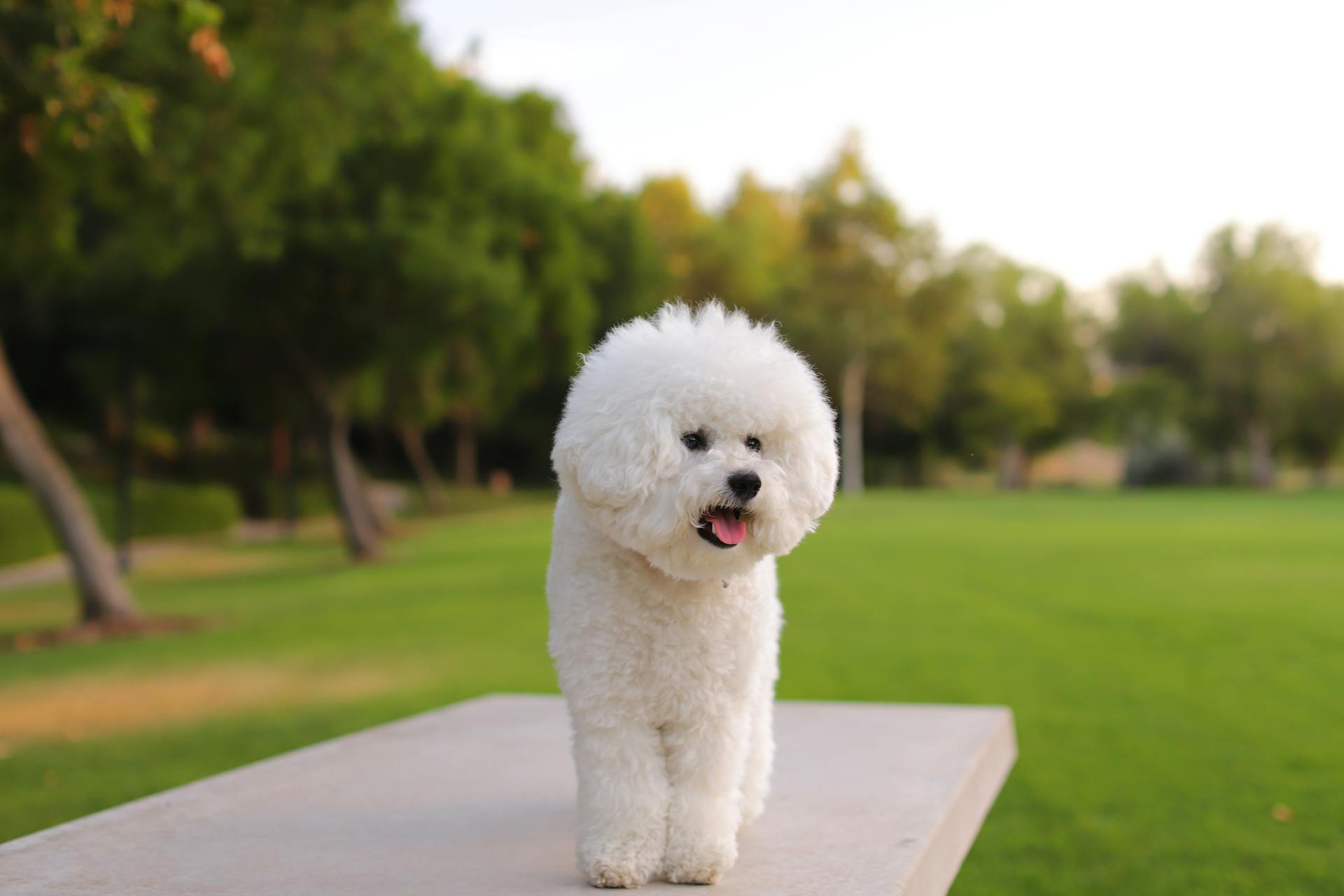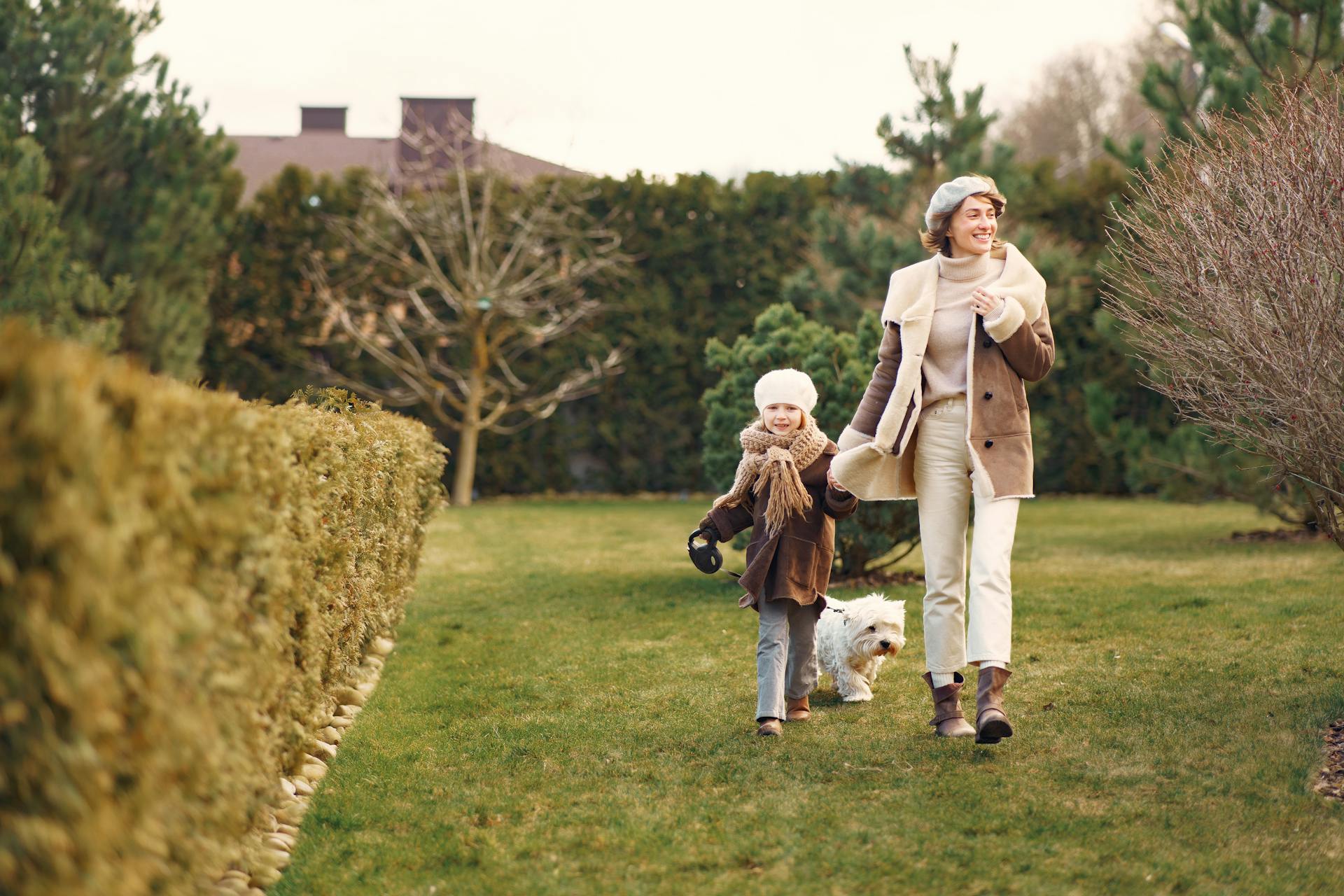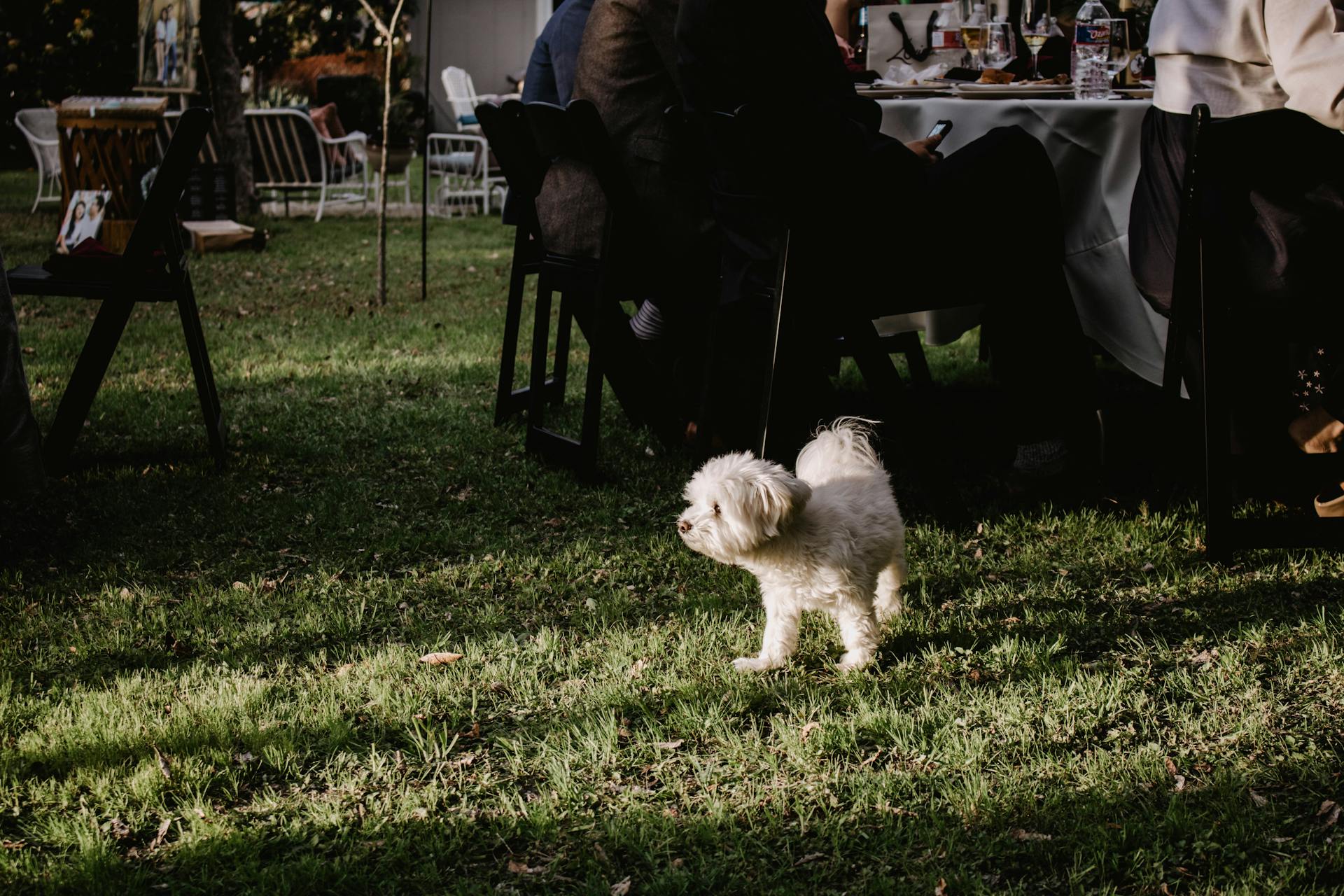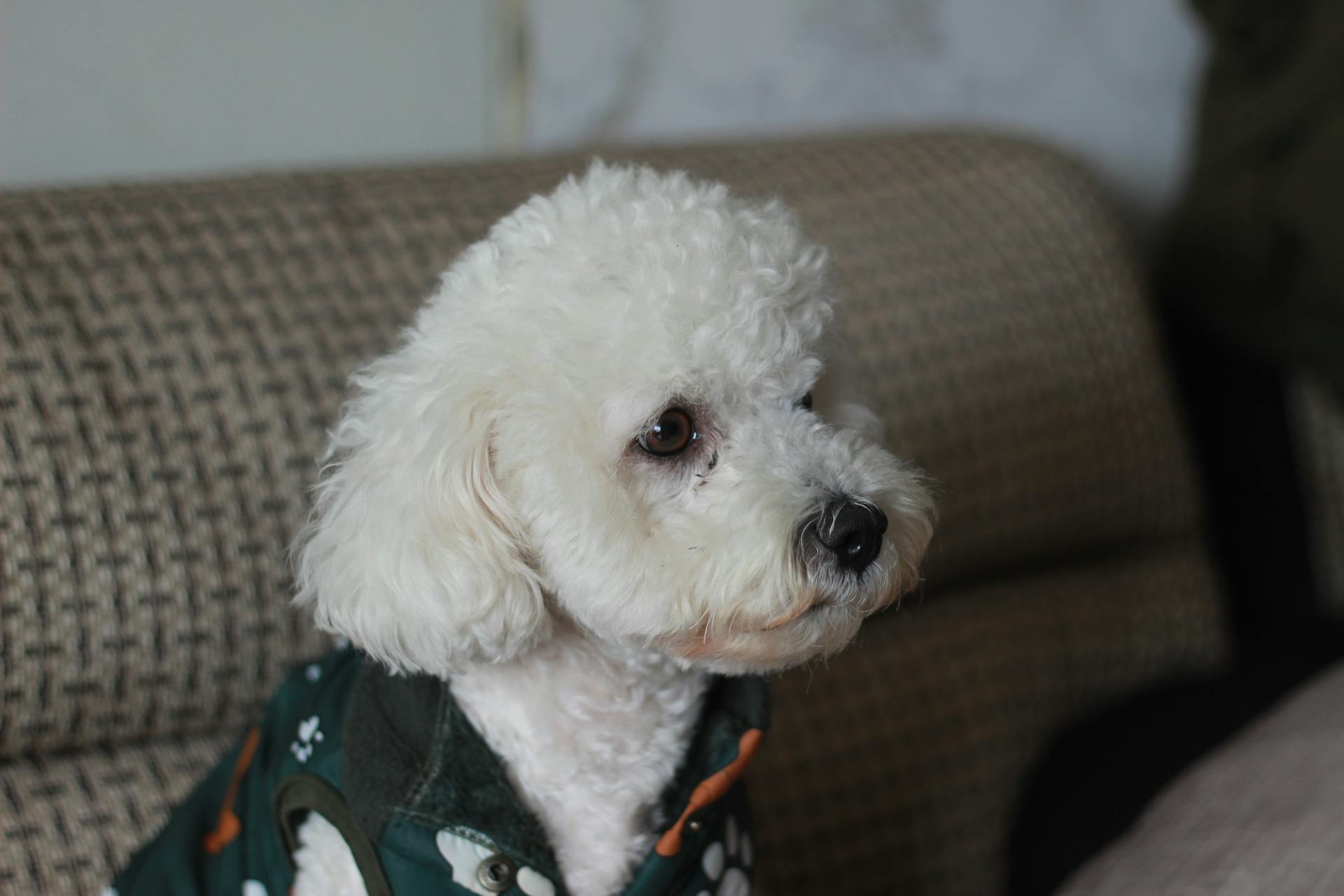
Bichon Frises can be a great choice for first-time owners, but it's essential to consider their needs and characteristics. They are playful dogs that require regular exercise and mental stimulation.
They are adaptable to apartment living, but they do need daily walks and playtime. This can be a challenge for first-time owners who are still learning to balance their work and personal life.
Bichon Frises are known for their gentle and affectionate nature, which makes them a great fit for families with children or for people who want a low-maintenance companion. They are generally easy to train, but consistency and patience are key.
Their low-shedding coat requires regular grooming, which can be a significant commitment for first-time owners.
Readers also liked: Which of These Characteristics First Developed in Reptiles?
Temperament and Personality
Bichon Frises are known for their friendly and gentle nature, making them a great fit for first-time owners. They thrive on human companionship and enjoy being part of a loving family.
Bichon Frises are social dogs that get along well with children and other pets if properly introduced and socialised from a young age. They have a playful and curious personality, often displaying a sense of humour.
One of the key things to keep in mind about Bichon Frises is that they can be prone to separation anxiety if left alone for long periods. They prefer to be in the company of their owners and may experience distress when separated.
Providing them with sufficient attention, mental stimulation, and companionship is crucial to ensure their well-being. With proper care and attention, Bichon Frises can make wonderful pets for first-time owners.
Here are some key temperament traits to consider:
- Friendly and gentle
- Social and affectionate
- Playful and curious
- Prone to separation anxiety if left alone for long periods
Bichon Frises are adaptable to small living spaces and don't require vast amounts of space to roam, making them a great fit for city living or smaller homes. They're happy to entertain themselves with puzzle toys and can tolerate some time alone in a crate, but anything longer than a few hours may cause separation anxiety.
Exercise and Health
As a first-time dog owner, it's essential to consider the exercise needs of your Bichon Frise. These dogs require about 30 minutes of activity per day, which can be broken down into shorter sessions.
You can start with a 20 to 30 minute walk, which will not only tire them out but also provide mental stimulation. If your Bichon Frise enjoys playing with other dogs, a trip to the dog park or a meetup with other owners can be a great way to get them moving.
Some Bichon Frises may also enjoy playing fetch, although it's not a guarantee. If your dog doesn't take to fetch, interactive play like tug-of-war can be a great alternative. And, as a bonus, Bichon Frises are natural swimmers, so if your dog enjoys the water, swimming can be a great form of exercise.
However, it's essential to remember that Bichon Frises can be prone to obesity and weight problems if they don't get enough exercise. To avoid this, make sure to provide your dog with a balanced diet and regular physical activity.
Here are some exercise ideas for your Bichon Frise:
- Walking (20-30 minutes)
- Freeplay with other dogs
- Fetch (if your dog enjoys it)
- Swimming (if your dog enjoys the water)
- Agility training (for more advanced dogs)
As your Bichon Frise gets older, you may need to take special precautions to make them more comfortable, such as installing ramps or steps. But, with regular exercise and a balanced diet, your Bichon Frise can live a happy and healthy life.
Take a look at this: Bichon Frise Black and White
Grooming and Maintenance
The Bichon Frise's grooming needs are a big consideration for first-time owners. They require daily brushing to keep their coat detangled and free of debris.
Their curly coat is a beautiful feature, but it needs to be brushed daily with a wide-tooth comb or a pin brush to prevent matting. This is especially important on their underside where matting is most likely to occur.
You'll also need to bathe your Bichon Frise every two weeks or twice a month, and trim their coat about once a month. This can be a lot of work, but it's worth it to keep their coat looking its best.
Their coat is also hypoallergenic and non-to-low shedding, which is great news for owners with allergies. This means your home will be mostly dog fur-free.
In addition to brushing and bathing, you'll need to spend some time each day cleaning their face and other areas where they may develop fur staining. Regular nail trimming and teeth cleaning are also a must to keep your Bichon Frise healthy and happy.
See what others are reading: How Do Cats Know What Time It Is?
Professional grooming every month or so is also a good idea to keep their coat in tip-top condition. This will also give you a chance to bond with your dog and help them get used to the grooming process.
Regular ear checks and cleaning can help prevent ear infections by removing fur from their ears. This is an important part of their grooming routine.
Training and Behavior
Bichon Frises are highly intelligent dogs that love learning new tricks, making them a great breed for first-time owners who are willing to put in the time and effort. They are fast learners and respond well to training.
Bichon Frises are social dogs that thrive on human interaction and playing with other dogs, so socialization from an early age is essential. They will benefit from attending puppy socialization classes and being introduced to various situations, such as car travel and unfamiliar noises.
Bichon Frises start to approach new experiences with caution around 12 weeks old, so it's crucial to expose them to different situations before this milestone. Introduce your Bichon Frise to other dogs, people, and livestock, as well as car travel and unfamiliar noises, such as traffic.
Check this out: What Is the Time on the White Rabbit's Pocket Watch?
Consistency and patience are key when training a Bichon Frise. They can be convinced to follow your lead with the right motivation, such as treats and praise. Start with treat training and use plenty of praise to keep them engaged.
Some Bichon Frises can have a stubborn streak, so keeping training sessions engaging and varied is essential. Mix in fun activities and mental stimulation, such as puzzle toys and interactive games, to maintain their interest and prevent boredom.
Here are some tips for training a Bichon Frise:
- Use treats and praise to motivate them.
- Keep training sessions short and fun.
- Be consistent and patient.
- Mix in mental stimulation and fun activities.
Remember, Bichon Frises are intelligent and eager to please, but they require consistent and patient training methods. With positive reinforcement techniques and gentle guidance, you can establish good behavior patterns and socialize them effectively.
Owning a Bichon Frise
Bichon Frises are a great choice for first-time owners. They adapt to most environments and have a friendly nature.
Bichon Frises have fairly low exercise needs, requiring around 30 minutes to 1 hour of physical activity per day. This can be achieved through daily walks, playtime in a secure area, and interactive games.
Bichon Frises are intelligent dogs and respond well to positive reinforcement. They can pick up training quickly, especially with the use of treat training and plenty of praise.
Here are some tips to keep in mind when training your Bichon Frise:
- Start with treat training.
- Use plenty of praise.
- Make it fun.
- Be prepared to be ignored, sometimes.
- Don't forget their performing background!
Dietary Requirements
Feeding your Bichon Frise a balanced diet is crucial for their overall health. Your furry friend will thrive on complete dog food specially formulated for small breeds.
To avoid overfeeding, consider dividing daily rations into 3-4 smaller servings for growing pups. As they mature, you can gradually reduce this to two meals a day.
The ideal portion size will depend on your dog's activity level, age, and metabolism. Your Bichon Frise's diet should be tailored to their individual needs to prevent weight gain.
Don't forget to provide plenty of exercise to complement a healthy and balanced diet. Regular physical activity will keep your Bichon Frise happy and content.
For personalized dietary advice, consult with your local vet or the breeder you purchased your puppy from. They can provide you with specific guidance tailored to your dog's unique needs.
Additional reading: Shih Tzu Bichon Poodle Mix
Cost of Owning
Owning a Bichon Frise can be a costly endeavor, but it's essential to consider the expenses involved to ensure you're prepared.
The cost of owning a Bichon Frise can be broken down into several categories.
Dog food is a significant expense, with the average monthly cost ranging from £80 to £90.
Veterinary care is also a crucial aspect to consider, as Bichon Frises require regular check-ups and potential treatments.
Pet insurance can help alleviate some of the financial burden associated with veterinary care.
You'll also need to budget for kennels or dog sitters if you need to travel or are away from home for an extended period.
Regular dog grooming costs can add up quickly, with Bichon Frises requiring regular baths, trims, and styling.
Toys and equipment, such as chew toys and beds, are also necessary expenses.
Preventative healthcare, including vaccinations and parasite control, is essential to keep your Bichon Frise healthy.
For another approach, see: Shih Tzu Maltese Bichon Frise
Here's a rough breakdown of the ongoing costs of owning a Bichon Frise:
- Dog food: £80-£90 per month
- Veterinary care: varies depending on the individual dog's needs
- Pet insurance: £10-£30 per month
- Kennels or dog sitters: £20-£50 per day
- Regular dog grooming costs: £30-£60 per session
- Toys and equipment: £20-£50 per month
- Preventative healthcare: £10-£30 per month
Dog Owner Checklist
Owning a Bichon Frise requires careful consideration of several factors. As a first-time dog owner, it's essential to ensure you have the time and energy to dedicate to your Bichon Frise, which can live for 10-13 years.
Living space is also a crucial factor. Bichon Frises are adaptable to small environments, making them a great choice for apartment dwellers.
Your activity level will also determine the best breed for you. If you're an active person who loves outdoor activities, a Bichon Frise might be a good fit, but if you prefer the indoors, consider their exercise needs.
Owning a Bichon Frise can be costly, so make sure you have enough budget for dog training, dog food, professional grooming, and vet visits.
Here are some estimated costs to consider:
If you have children or other pets, consider their needs and compatibility with your Bichon Frise.
First Time Owners
Owning a Bichon Frise can be a fantastic experience for first-time owners. Bichon Frises are a great choice for first-time owners because they adapt to most environments and have a friendly nature.
They like to experience new things and will pick up training and commands quickly. Consistent training using positive reinforcement methods is essential for their development.
Bichons have fairly low exercise needs, so they aren’t as big of a commitment when it comes to exercise. You won’t have to spend hours walking them, so they should fit in with most modern lifestyles.
To train a Bichon Frise, start with treat training. Tasty rewards are a quick and sure way to convince them that they’re going to love training! If your pup isn’t super food motivated, you might try having a few different treats on hand so that you can keep their interest with more variety.
Here are some essential tips for training a Bichon Frise:
- Use plenty of praise. Bichon Frises are people-oriented dogs and love verbal praise and pets.
- Always make it fun. Think of every training session like a fun game so that your doggo is in the right mindset to learn.
- Be prepared to be ignored, sometimes. Bichon Frises can have “selective hearing,” which can be frustrating during a training session.
- Don’t forget this dog’s performing background! Bichon Frises have picked up a few performance skills since then, so consider teaching them more complex, showy, and fun tricks.
If you're considering getting a Bichon Frise, here are some other factors to keep in mind:
- Commitment: Bichon Frises have an average of 10-13 years of age profile, so ensure you have the time and energy to dedicate to your breed.
- Space and personal preference: Bichon Frises adapt to most environments, but they do require regular health care attention and exercise.
- Budget: Owning a Bichon Frise can be costly, so make sure you have enough budget for dog training, dog food, professional grooming, and vet visits.
- Family members: If you have children or other pets, consider their needs and compatibility with the other dogs.
Frequently Asked Questions
What are the disadvantages of a Bichon Frise?
Bichon Frises can be prone to separation anxiety and may require extra attention, while their vocal nature requires consistent training and socialization. They're best suited for households with someone home most of the day.
Sources
- https://www.puppyleaks.com/best-breed-for-first-time-dog-owners/
- https://www.borrowmydoggy.com/doggypedia/dog-breed-guides-bichon-frise
- https://mypetcommand.com/blogs/news/best-dog-breeds-for-first-time-owners-low-maintenance-dogs-for-small-spaces
- https://www.myfamilyvets.co.uk/bichon-frise-breed-guide
- https://www.madpaws.com.au/blog/dog-breed-corner-bichon-frise/
Featured Images: pexels.com


